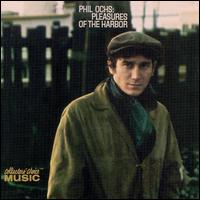
Philip David Ochs was an American protest singer and songwriter who was known for his sharp wit, sardonic humor, earnest humanism, political activism, insightful and alliterative lyrics, and distinctive voice. He wrote hundreds of songs in the 1960s and 1970s and released eight albums.

Gunfight At Carnegie Hall is the final album by Phil Ochs released during his lifetime, comprising songs recorded at the infamous, gold-suited, bomb-threat shortened first show at Carnegie Hall in New York City on March 27, 1970, though it contains less than half of the actual concert. The shows recorded that day served to surprise Ochs' fans, from his gold lamé Nudie suit, modeled after Elvis Presley's, to his covers of Presley, Conway Twitty, Buddy Holly and Merle Haggard songs, to his own re-arranged songs. Some fans loved it, but some attendees at the show were unhappy with the music he was playing, wanting only to hear "old" Ochs. Before he had a chance to convince them, the concert was cut short by a telephoned bomb threat. Some angry fans who had paid for a full concert confronted Phil at dinner between shows. He took their names, promising to get them into the second show for free, but the box office was locked and Ochs smashed the glass, severely cutting his thumb. He appeared onstage at the second show with a bandaged hand, telling the audience the story. Breaking into the lockbox was the last straw. While they let Ochs perform the second show, he was banned immediately afterwards from performing again at the venue.

Greatest Hits was Phil Ochs' seventh LP and final studio album. Contrary to its title, it offered ten new tracks of material, mostly produced by Van Dyke Parks, and was released in 1970.
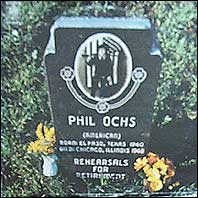
Rehearsals for Retirement is Phil Ochs's sixth album, released in 1969 on A&M Records.
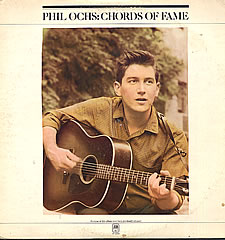
Chords Of Fame was a 2-LP compilation of folksinger Phil Ochs' career, compiled by his brother shortly after Ochs' death in 1976. Released on A&M Records, it compiled tracks Ochs had recorded for both that label and Elektra Records. The compilation included several rarities:

Sings For Broadside, alternatively known as Broadside Ballads, Vol. 10, was a 1976 compilation of songs that Phil Ochs had recorded for Broadside Magazine as demonstration recordings or at benefit shows for them. Initially, Ochs had hoped for the magazine to release one single concert, but when the material he presented to them came up far too short for a full LP and not featuring several of his best and well-known numbers, he suggested they splice on whatever they desired. The result was this album, which featured tracks recorded between about 1965 and about 1973.

Live at Newport is a 1996 compilation on Vanguard Records of folk singer Phil Ochs' three appearances at the Newport Folk Festival, in 1963, 1964 and 1966. Presenting twelve tracks that also appear on his first, second, third, fourth and fifth albums, Ochs is at his peak as a folk singer throughout, singing anti-war songs alongside those espousing civil rights and worker's rights, and showcasing some more introspective numbers that would be dramatically rearranged on the fourth and fifth albums.

The Early Years is a compilation of seven recordings Phil Ochs made for a Vanguard compilation in 1964 and twelve made at three Newport Folk Festivals in 1963, 1964 and 1966, the latter tracks previously released on the 1996 compilation Live at Newport.

The War Is Over: The Best of Phil Ochs is a 1988 compilation album of Phil Ochs' works on A&M Records recorded between 1967 and 1970. With varying amounts of tracks from the albums, between two and five, from each album except Gunfight At Carnegie Hall, it paints a portrait of Ochs' later works that does not emphasize his folk songs, instead presenting the more introspective and/or experimental tracks. It did feature a live version of "I Ain't Marching Anymore" later reissued as a part of the 1991 album that presented the entire concert from which it was culled, There And Now: Live in Vancouver 1968.

There and Now: Live in Vancouver 1968 [sic] was a 1990 archival release of a concert by Phil Ochs in Vancouver, British Columbia, Canada, at the PNE Garden Auditorium on Thursday, March 13, 1969. Performing solo with guitar, Ochs was worn, weary and despairing in the aftermath of the 1968 Democratic National Convention in Chicago. Ochs presents some of his older material, such as "There But For Fortune," "Changes" and "The Highwayman," alongside then-new songs from the as-yet-unreleased Rehearsals for Retirement such as "The Doll House" and "William Butler Yeats Visits Lincoln Park and Escapes Unscathed." The album thus documents two eras of Ochs in one seventy-minute show.

American Troubadour is a 1997 British 2-CD set that presented a portrait of singer-songwriter Phil Ochs' later career, featuring selections from each of the five albums he recorded for A&M Records, from various non-album single sides and from a performance Ochs gave on March 13, 1969, in Vancouver, British Columbia. It is notable for the inclusion of Ochs' post-1970 single sides, otherwise unavailable on compact disc and for the inclusion of a cover of Chuck Berry's "School Days", a previously unavailable outtake from Ochs' infamous March 27, 1970, concert at Carnegie Hall.
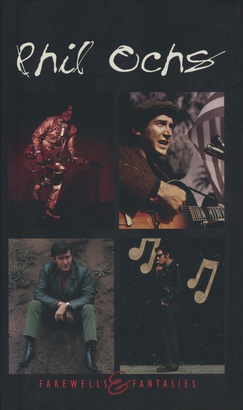
Farewells & Fantasies is the 1997 posthumous box set of the work of singer/songwriter Phil Ochs, chronicling his life and career in music from 1964 through 1970. With its non-chronological running order, it plays like three separate albums, each showcasing a different side of Ochs. The compilation was produced by Gary Stewart, Michael Ochs and Meegan Lee Ochs. Liner notes include a foreword by Meegan Lee Ochs, "The Sound of Freedom Callin'" by Michael Ventura and "Song of a Soldier: The Life and Times of Phil Ochs" by Mark Kemp, track-by-track explanations by Ben Edmonds, discography, selected bibliography, and many photographs, some of which are from the family's private collections. The box set is dedicated to a friend, co-writer, and inspiration to Phil Ochs, Bob Gibson, who died while the box set was in production. Its title comes from the back of Ochs' LP Tape from California.

Postcards of the Hanging is a compilation album by the Grateful Dead. It consists entirely of Bob Dylan covers, performed live in concert, along with a rehearsal performance of "Man of Peace" featuring the Grateful Dead backing Dylan himself. Bob Weir sings lead on six tracks, Jerry Garcia on two, and Brent Mydland on two. Another Dylan covers collection, Garcia Plays Dylan, includes performances by the Grateful Dead, but mostly by the Jerry Garcia Band and other Garcia side projects.
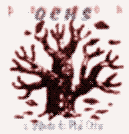
Poison Ochs: A Tribute to Phil Ochs is a tribute compilation to the music of the late Phil Ochs. Ochs' songs, which are generally thought of as folk music and folk rock, are performed by musicians associated with indie rock and experimental rock.

"Bwatue" is a song by Phil Ochs, a U.S. singer-songwriter best known for the protest songs he wrote in the 1960s. He co-wrote the song with two African musicians named Dijiba and Bukasa. "Bwatue" was written and recorded in 1973.

The discography of Phil Ochs, a U.S. protest singer and songwriter, consists of seven studio albums, six live albums, six compilation albums, one box set, six other albums, and nine singles.
Lincoln Mayorga is an American pianist, arranger, conductor and composer who has worked in rock and roll, pop, jazz and classical music.
"Crucifixion" is a 1966 song by Phil Ochs, a U.S. singer-songwriter. Ochs described the song as "the greatest song I've ever written".
"Cross My Heart" is a 1966 song by Phil Ochs, an American singer-songwriter best known for the protest songs he wrote in the 1960s.


